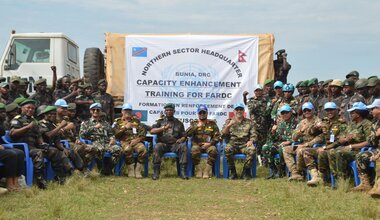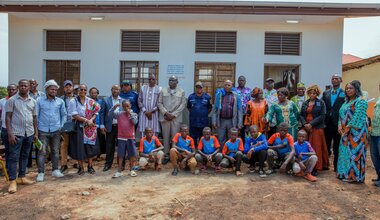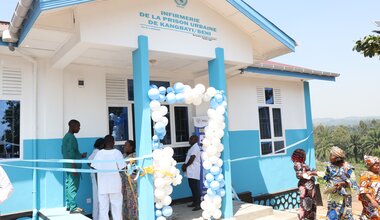INTERVIEW: Alain Le Roy Discusses U.N. Peacekeeping Operations
Source: National Public Radio in "All Things Considered", Washington, 4 May 2011
Michele Norris talks with the head of U.N. Peacekeeping Operations, about sexual violence in the Congo and the impact of Rwanda on future peacekeeping missions.
Transcript:
ROBERT SIEGEL, host:
The head of the United Nations peacekeeping is in Washington today to talk with U.S. officials about the future of Libya. Alain Le Roy says the U.N. must be ready at any time if it's called upon to monitor a cease-fire in Libya.
Peacekeepers are already heavily engaged in other conflicts in Africa, conflicts that don't often lead the news but in which millions have been displaced or murdered: Ivory Coast, Darfur, Congo, and there are more.
MICHELE NORRIS, host:
Alain Le Roy sat down in our studios today, and we began with the subject of Congo. Millions have died there and armed gangs commit rape and other atrocities on a daily basis. U.N. peacekeepers have been in Congo for more than a decade. Mr. Le Roy said they're hampered by a lack of resources, vital equipment, such as helicopters, for instance, in a country where roads are often impassable.
Mr. ALAIN LE ROY (Under-Secretary-General, Peacekeeping Operations, United Nations): We have been asking for helicopters for years from all member states, and it's extremely difficult to get them.
NORRIS: Why so hard?
Mr. LE ROY: Because people said they are - all the helicopters are needed in Afghanistan or other places. They said they have a lack of capacity. But I'm sure some country has still some spare helicopters that could be very useful in U.N. peacekeeping to protect so many lives. And every day in the Congo, we protect hundred thousand of lives, but there are still people being killed or women being raped because we are not able to react rapidly enough.
NORRIS: I want you to respond to something. The U.N.'s own envoy, the Special Representative on Sexual Violence in Conflict Margot Wallstr�m called Congo the rape capital of the world; very strong statement. Are peacekeepers doing a better job now of protecting women from sexual violence? And how do you train peacekeepers to - so that they can do that?
Mr. LE ROY: Yes. We are not deployed all over the Congo. There are many rape and sexual violence all over the Congo. Where we are in the present, we have 20,000 peacekeepers, a bit less in eastern Congo. The population just with the two small provinces of Sud-Kivu is 10 million people. It means 20 peacekeepers to protect 10,000 people. We are mostly present in the east. That's where our mandate is.
There, I think, we try a lot. We have the mandate to protect civilians, and of course, to protect civilians from sexual violence. And for that, we have developed specific training capacity, because no army in the world is being trained to protect civilians. They are trained to make war, but they are not trained to protect civilians and not to protect civilians from sexual violence.
So we are developing what we call scenario-based training. If you are called by a woman, how to interact with them. So we develop very much this kind of scenarios to train our peacekeepers. And we try also to increase proportion of women within peacekeeping in the military and in the police. We are now a bit above 10 percent of women in our police capacity in our missions. We want to reach at least 20 percent by 2014.
NORRIS: As U.N. peacekeepers.
Mr. LE ROY: As U.N. peacekeepers in the police, yeah.
NORRIS: Mm-hmm. In the Congo, the U.N. peacekeepers have been asked to think about the exit now. There are some who are saying it's time for the peacekeepers to leave. What do you say to that?
Mr. LE ROY: First, there will be legislative election in the Congo by the end of the year, 28th of November. After that, if this election are going well and if our common fight with the Congolese army is continuously successful, then it might be a time to think of the drawdown, yes.
NORRIS: Oftentimes, U.N. peacekeepers are on the ground in places where conflict is still ongoing, even after a cease-fire, even after peace has been carefully negotiated or declared. So help us understand what peacekeeping actually means.
Mr. LE ROY: If we listen to Mr. Brahimi, who made a famous report in 2000, we should be sent anywhere there is a peace to keep. But it's clear that where we are being sent more and more is places where there is no real peace, and our job is to reduce the level of violence, to protect civilians and to try politically to reach a real peace between the different stakeholders. We are doing that. We are doing that in Sudan. We are doing that in Liberia, in the Congo. We are doing that in Haiti and many other places.
And I must say, I know that U.N. peacekeeping is very often criticized because we are not able to protect every civilian. But we have so many achievements. In Haiti, we have helped a lot to bring stability and security to Haiti. Even in the Congos, it's written today, still very difficult and serious. But there have been tremendous progress. So there are so many achievements where we have been able to stabilize, protect lives. And in the end, when the situation is stable, then we prepare the exit strategy.
NORRIS: Alain Le Roy is the under-secretary-general of the United Nations Department of Peacekeeping Operations.
Thank you very much for coming in.
Mr. LE ROY: Thank you, Michele.
 ONU
ONU Nations Unies Maintien de la paix
Nations Unies Maintien de la paix




